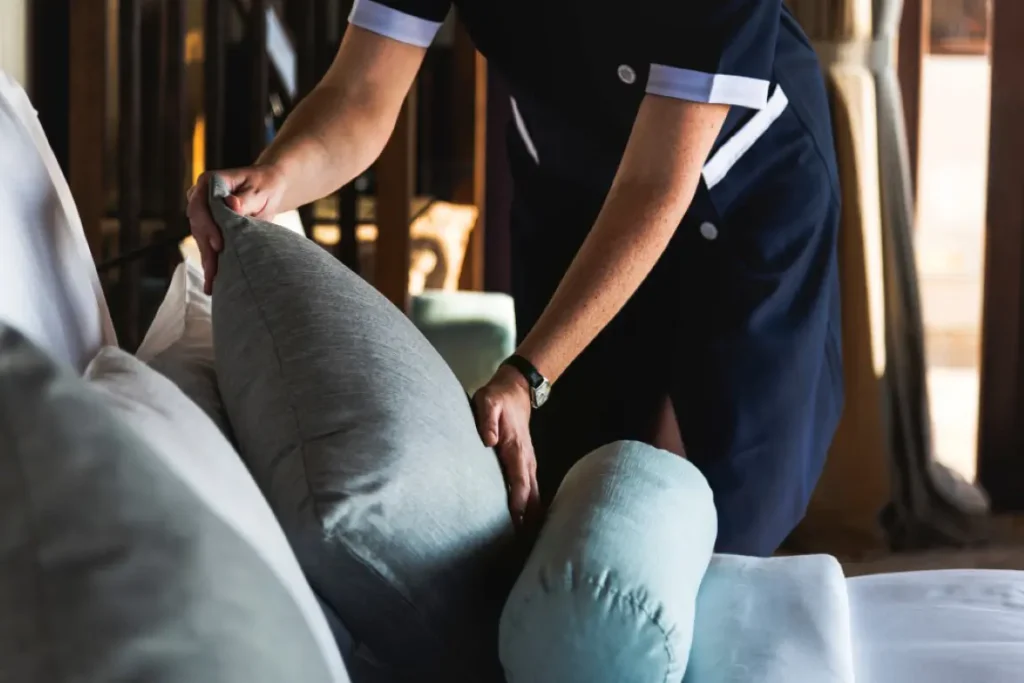
California’s New Safety Rules for Hotel Housekeepers
-
Sep 08, 2020
-
Blog
-
Michael Burgis & Associates, P.C
Hotel housekeepers face daily risks of musculoskeletal injuries due to repetitive and physically demanding tasks like lifting heavy mattresses, pulling linens, pushing carts, and cleaning slippery bathrooms. These injuries, affecting muscles, tendons, nerves, and joints, can lead to chronic pain and disability. To address this, California introduced a groundbreaking regulation: the Musculoskeletal Injury Prevention Program (MIPP). Approved on March 9, 2018, and effective since July 1, 2018, this first-of-its-kind ergonomic standard aims to protect housekeepers in the hotel and lodging industry. This comprehensive guide explores the MIPP’s background, requirements, benefits, and what injured workers can do to seek compensation. If you’re a housekeeper dealing with a workplace injury, learn how Michael Burgis & Associates, P.C., can help you navigate workers’ compensation claims.
The Need for the Musculoskeletal Injury Prevention Program
Musculoskeletal injuries are among the most common workplace injuries for hotel housekeepers, driven by the repetitive and strenuous nature of their work. According to the International Union of Food, Agricultural, Hotel, Restaurant, Catering, Tobacco and Allied Workers’ Associations (IUF):
- Hotel workers have a 40% higher chance of workplace injury compared to other service-sector employees.
- Housekeepers suffer the highest rate of musculoskeletal injuries among all studied occupations.
- Between 2010 and 2014, workers’ compensation claims in the accommodation industry increased by an average of 897 per year.
- In 2013, the nonfatal injury and illness rate for hotel and motel workers was 5.4, compared to 3.5 for all industries.
These statistics highlight the urgent need for protective measures. Tasks like lifting heavy mattresses, pulling linens, and pushing carts strain the back, shoulders, and upper extremities, leading to conditions such as carpal tunnel syndrome, tendonitis, and back pain. Advocacy efforts, led by groups like UNITE HERE, pushed for this regulation after years of documenting high injury rates and inadequate workplace safety measures.
Overview of the New Regulation
Six years after representatives of hotel workers asked the Occupational Safety and Health Standards Board to create new regulatory standards for the on-the-job hazards that housekeepers in hotels face, their efforts paid off. On March 9, 2018, the Office of Administrative Law approved the ergonomic standard that will protect housekeepers from workplace injuries. The California Division of Occupational Safety and Health (Cal/OSHA) began enforcement of the new rule on July 1, 2018.
This regulation, outlined in Title 8, California Code of Regulations, Section 3345, is the first ergonomic standard in the U.S. specifically designed for hotel housekeeping staff. It requires employers in the hotel and lodging industry to establish and maintain a Musculoskeletal Injury Prevention Program (MIPP) to identify, evaluate, and control hazards that contribute to musculoskeletal injuries.
Key Components of the MIPP
The nature of the jobs done by housekeepers in the hospitality industry exposes them to musculoskeletal injuries when they have to lift mattresses, pull linens, and push heavy carts. Slips or trips, and falls as they clean bathrooms are also a cause of many injuries in this industry. Under the new regulation, employers must establish and maintain a workable Musculoskeletal Injury Prevention Program (MIPP). The MIPP, which can be part of an existing Injury and Illness Prevention Program (IIPP) or a standalone program, includes the following key components:
- Worksite Evaluations: Employers must conduct annual evaluations to identify hazards, involving housekeepers and their union representatives to ensure practical insights.
- Hazard Identification and Control: Employers must implement measures to eliminate or reduce identified hazards, such as:
- Using ergonomic equipment like lightweight carts or adjustable beds.
- Redesigning workflows to minimize repetitive motions.
- Providing non-slip footwear to prevent falls in bathrooms.
- Injury Investigation Procedures: When a musculoskeletal injury occurs, employers must investigate its causes, involving the injured worker, their supervisor, and union representatives to prevent recurrence.
- Training and Education: Employers must provide ongoing training for supervisors and housekeepers on:
Safe lifting and cleaning techniques.- Proper use of ergonomic tools.
- Recognizing early signs of musculoskeletal injuries.
- Early Injury Reporting: Clear procedures must be established for housekeepers to report injuries promptly, ensuring timely medical intervention and preventing worsening conditions.
These components aim to create a safer workplace by addressing the root causes of injuries.
Benefits of the MIPP for Housekeepers
The MIPP offers significant benefits for housekeepers and employers alike:
- Reduced Injury Rates: By proactively addressing hazards, the program can lower the incidence of musculoskeletal injuries, which account for nearly 5% of injuries among California’s 100,000 housekeepers.
- Improved Workplace Safety: Safer work environments enhance employee morale, productivity, and job satisfaction.
- Long-Term Health Outcomes: Preventing repetitive strain injuries reduces the risk of chronic conditions like tendonitis or permanent disability.
- Cost Savings for Employers: Fewer injuries lead to lower workers’ compensation costs, reduced absenteeism, and improved employee retention.
The regulation also empowers housekeepers by involving them in hazard identification and program development, ensuring their voices are heard.
Challenges in Implementing the MIPP
While the MIPP is a significant step forward, employers may face challenges in implementation:
- Cost of Compliance: Purchasing ergonomic equipment or redesigning workflows can be expensive, particularly for smaller hotels.
- Training Requirements: Ongoing training for all staff requires time and resources, which may strain budgets.
- Resistance to Change: Some employers may resist adopting new practices due to operational disruptions or a lack of awareness.
- Enforcement Variability: Compliance depends on Cal/OSHA inspections, which may vary in frequency and rigor.
Despite these challenges, the long-term benefits of reduced injuries and improved workplace safety outweigh the initial costs. Employers can access resources, such as Cal/OSHA’s fillable MIPP template, to streamline compliance.
What If You’re Already Injured?
While the new standards may limit the number of workplace injuries among housekeepers in California, those who have already suffered musculoskeletal injuries may experience long-term health problems. These injuries are compensable, and benefits claims may be filed with the workers’ compensation insurance system for coverage of medical expenses and lost wages. Workers’ compensation benefits may include:
- Medical Expenses: Costs for doctor visits, physical therapy, medications, or surgeries related to the injury.
- Lost Wages: Compensation for time missed from work due to the injury.
- Disability Benefits: Payments for temporary or permanent disability if the injury impacts your ability to work.
The proceedings can be challenging, but help is available from an experienced workers’ compensation attorney who can assist with the navigation of the claim. Common challenges include claim denials, delays, or disputes over the extent of benefits. An attorney can help you:
- File a claim accurately and on time.
- Gather necessary documentation, such as medical records and injury reports.
- Appeal denied claims or negotiate fair settlements.
Comparison to Existing Standards
The MIPP is unique as the first U.S. regulation specifically targeting hotel housekeepers. Unlike general Cal/OSHA ergonomics standards, which apply broadly to workplaces, the MIPP focuses on the hospitality industry’s unique hazards. For example, general standards may address repetitive motion injuries across industries, but the MIPP mandates specific actions like housekeeper involvement in hazard identification, tailored to their roles. This targeted approach ensures more effective protection for a high-risk group.
Frequently Asked Questions (FAQs)
To address common concerns and long-tail queries, here are answers to frequently asked questions about the MIPP and related topics:
What is a musculoskeletal injury?
Musculoskeletal injuries affect muscles, bones, tendons, ligaments, nerves, or joints, often caused by repetitive motions or overexertion, such as lifting heavy mattresses or pushing carts.
Who does the MIPP apply to?
It applies to employers in California’s hotel and lodging industry, including hotels, motels, resorts, and bed and breakfast inns employing housekeeping staff.
How can I report a workplace injury?
Notify your supervisor immediately and follow your employer’s injury reporting procedures. Document the incident with details like date, time, and circumstances.
What should I do if my employer doesn’t follow the MIPP?
File a complaint with Cal/OSHA, providing documentation of non-compliance, such as lack of training or hazard controls.
Can I get workers’ compensation for a pre-existing condition aggravated at work?
Yes, if work duties worsen a pre-existing condition, you may be eligible for benefits covering related medical costs and lost wages.
How long do I have to report a work injury in California?
You must report the injury to your employer within 30 days of the injury or when you become aware it’s work-related.
What if my workers’ compensation claim is denied?
You can appeal the denial with the help of a workers’ compensation attorney to ensure your rights are protected.
If you’re a housekeeper suffering from a work-related musculoskeletal injury, don’t navigate the complex workers’ compensation process alone. The experienced team at Michael Burgis & Associates, P.C., is dedicated to helping injured workers secure the benefits they deserve. Contact us today for a free consultation to discuss your case and explore your legal options.
Visit our website to learn more and schedule your free consultation.
Source: ohsonline.com, “California’s Housekeepers Ergonomics Standard Takes Effect July 1″, March 15, 2018
Jerry DiLeva
"Michael told me that he was going to do the best he can for me, my family, and for my future needs. He's surrounded by a staff. A staff so excellent they're very knowledgeable, professional, and very kind, courteous ... If you're really serious in a workman's comp case what can I say Michael Burgis is the guy. His staff will treat you right, you'll go in the right direction and I guarantee you will win."
See What Our clients say






